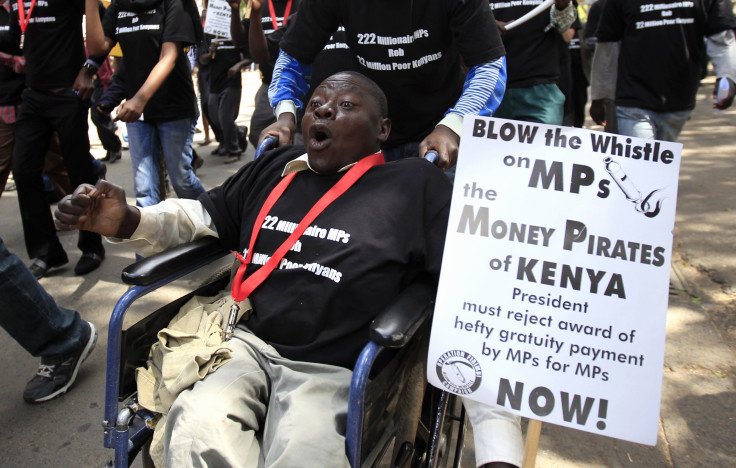Kenyan MPs Agree To Cut Their Salaries … Sort Of

Lawmakers in Kenya have agreed to rescind a planned salary hike, following outrage and protests by the public weary of politicians who already earn exorbitant wages in an impoverished country with an estimated 50 percent unemployment rate.
The Salaries and Remuneration Commission (SRC), an independent government-appointed body which establishes public sector pay, said that Kenyan MPs’ annual salary will be cut to 6.38 million Kenyan shillings ($75,000) from $120,000.
However, in exchange for agreeing to the salary cut, MPs will now receive a tax-free car allowance for about $58,000. MPs will also receive generous pension benefits, armed guard protection, diplomatic passports and use of VIP lounges in airports, as part of the new compensation package.
Moreover, under terms of the new deal, Kenya’s 416 MPs (comprising 349 members of the National Assembly and 67 Senators) will be paid a monthly taxable salary of 532,500 Kenyan shillings. This figure will increase by 44,375 shillings every year –- meaning they will be raking in 710,000 shillings per month by the fifth year (or 8,520,000 shillings annually, which equates to almost $100,000 at current exchange rates).
"It was a compromise on both sides, a retreat for MPs in the face of public pressure. It also allows the salaries commission to save face, although it yielded ground," said Macharia Munene, a lecturer on international relations at the United States International University in Nairobi, according to Reuters.
Last month, in stark defiance of both the SRC and President Uhuru Kenyatta, MPs had voted themselves a salary increase to $120,000, a measure that enraged Kenyans who, on average, earn about $1,800 annually (among those that have jobs, at least).
Demonstrators angrily held up banners with the caption “MPigs” to protest the earlier pay hike while others held up signs saying: "Don't like the pay? Quit.”
But now even with all the perks they have gained, MPs are less than happy with the new deal.
"It amounts to a reduction of what the MPs were seeking," Irungu Kangata, a lawyer and MP, told Reuters.
"However, the MPs do not seem to want to put up a fight anymore, maybe because the president has been involved, they do not want to appear to go against him."
SRC indicated earlier this year that, at the $75,000 annual salary rate, Kenyan MPs’ wages are roughly comparable to what their counterparts in France and India receive.
However, according to the World Bank, France ($42,379) and even India ($1,509), have significantly higher GDP per capita income than does Kenya ($808).
In 2010, The Economist reported that then-Kenyan Prime Minister Raila Odinga was the highest paid head of state -- by a very wide margin -- relative to the country’s GDP per person, as measured on a purchasing power parity basis. At that time, Odinga’s $430,000 annual salary was 240 times greater than the average Kenyan GDP per person. The next leader on the list, Lee Hsien Loong, the prime minister of Singapore, was paid more than 40 times the city-state's GDP per person.
Despite an economic recovery in recent years, the World Bank stated that almost 46 percent of Kenyans live below the poverty line, while corruption among elite business leaders and senior politicians remain entrenched.
© Copyright IBTimes 2024. All rights reserved.











